
-
 Vaccine misinformation: a lasting side effect from Covid
Vaccine misinformation: a lasting side effect from Covid
-
Indian court finds man guilty in notorious hospital rape case

-
 TikTok's journey from fun app to US security concern
TikTok's journey from fun app to US security concern
-
The video games bedeviling Elon Musk

-
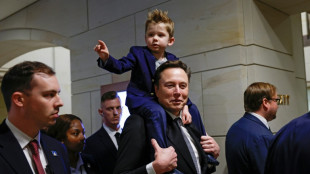 Gamers tear into Musk for 'faking' video game prowess
Gamers tear into Musk for 'faking' video game prowess
-
Global equities rally, pushing London and Frankfurt to new records

-
 US grounds SpaceX's Starship after fiery mid-air explosion
US grounds SpaceX's Starship after fiery mid-air explosion
-
US to tighten trade rules to hit low-cost China shipments

-
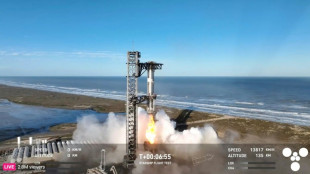 US grounds SpaceX's Starship rocket pending probe
US grounds SpaceX's Starship rocket pending probe
-
IMF raises global growth outlook and flags rising economic divergence

-
 London, Frankfurt hit record highs as global equities rally
London, Frankfurt hit record highs as global equities rally
-
Pompeii reveals 'impressive' bath complex

-
 EU deepens probe into X after Musk outbursts
EU deepens probe into X after Musk outbursts
-
London stock market hits record high as global equities rally

-
 2024 saw fastest-ever annual rise in CO2 levels: UK weather service
2024 saw fastest-ever annual rise in CO2 levels: UK weather service
-
'No money': gloom on Beijing streets as economic growth slows

-
 Nintendo shares tumble as Switch 2 teaser disappoints
Nintendo shares tumble as Switch 2 teaser disappoints
-
Apple sidelines AI news summaries due to errors
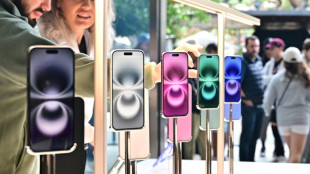
-
 China says population fell for third year in a row in 2024
China says population fell for third year in a row in 2024
-
Asian traders give mixed reaction as China's economic growth slows

-
 Chinese economic growth among slowest in decades
Chinese economic growth among slowest in decades
-
'Damaging' AI porn scandal at US school scars victims

-
 Nintendo shares tumble as Switch 2 preview disappoints
Nintendo shares tumble as Switch 2 preview disappoints
-
SpaceX catches Starship booster again, but upper stage explodes
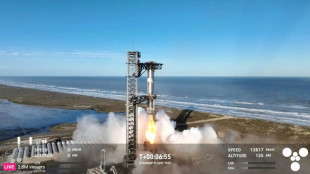
-
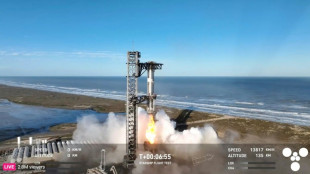 SpaceX catches Starship booster but upper stage explodes
SpaceX catches Starship booster but upper stage explodes
-
Hypertec Cloud Partners With Potentia to Power Sustainable AI Cloud Expansion With Additional 480MW of Balanced Capacity Across North America

-
 Insurance access for US homeowners with higher climate risks declines
Insurance access for US homeowners with higher climate risks declines
-
Wall Street rally loses steam as European luxury shares advance

-
 China set to post sluggish growth as doldrums deepen
China set to post sluggish growth as doldrums deepen
-
US braces for freezing weather fueled by polar vortex

-
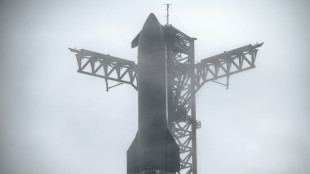 Musk's Starship set for launch after Bezos orbital triumph
Musk's Starship set for launch after Bezos orbital triumph
-
Surf star Slater pays tribute as Quiksilver co-founder Green dies

-
 Teen kills fellow student teacher at Slovak school
Teen kills fellow student teacher at Slovak school
-
LIV Golf sign United States broadcast deal with Fox Sports

-
 Slovak entrepreneur funding rescue of German flying taxi startup
Slovak entrepreneur funding rescue of German flying taxi startup
-
French researchers aim to ease X refugees' path with 'HelloQuitX'

-
 China property giant Vanke's CEO 'taken away' by police: report
China property giant Vanke's CEO 'taken away' by police: report
-
Oil giant BP cuts thousands of jobs to slash costs

-
 EU announces 120 mn euros in Gaza aid after ceasefire
EU announces 120 mn euros in Gaza aid after ceasefire
-
Nepal's top court bars infrastructure in protected areas

-
 Stock markets jump as inflation worries ease
Stock markets jump as inflation worries ease
-
China to probe US chips over dumping, subsidies

-
 India's outcast toilet cleaners keeping Hindu festival going
India's outcast toilet cleaners keeping Hindu festival going
-
Apple loses top spot in China smartphone sales to local rivals

-
 Sri Lanka signs landmark $3.7 bn deal with Chinese state oil giant
Sri Lanka signs landmark $3.7 bn deal with Chinese state oil giant
-
Blue Origin's New Glenn rocket blasts into orbit for first time

-
 UK economy rebounds but headwinds remain for govt
UK economy rebounds but headwinds remain for govt
-
Stocks follow Wall St higher on welcome US inflation data

-
 Blue Origin's New Glenn rocket blasts off in first launch, reaches orbit
Blue Origin's New Glenn rocket blasts off in first launch, reaches orbit
-
Chinese give guarded welcome to spending subsidies


The US economy is solid: Why are voters gloomy?
Cooling inflation, low unemployment, robust economic growth and... downbeat voters.
Despite indicators showing the US economy is moving in a healthy direction, many Americans remain pessimistic about business and job prospects -- a mood that poses a frustrating problem for Vice President Kamala Harris in her neck-and-neck race with Donald Trump for the White House.
Less than a month before November's presidential election, the US economy added around 100,000 more jobs than expected in September, saw wages grow further and inflation approach striking distance of policymakers' two percent target.
Yet, almost half the respondents of a New York Times/Siena College poll released Tuesday rated current economic conditions "poor."
Poll after poll has also found the economy -- particularly inflation -- to be a top voter concern by far.
While Harris has narrowed Trump's lead, polls have suggested voters favor the former president on economic issues.
Economists point to a cumulative rise in costs since the pandemic, still-high home prices and uneven job gains in explaining a seeming disconnect between data and voter sentiment.
"At the same time that they're aware that inflation has slowed, (consumers) remain frustrated by high prices," said Joanne Hsu of the University of Michigan.
For politicians, "the low-hanging fruit is trying to take aim at prices that people see on a day-to-day basis," economist Ryan Sweet of Oxford Economics said, referring to food and gas.
"This election cycle just highlights inflation is extremely unpopular," he added.
- Price shock -
"Over the last few years, consumers have gone through a period of very large price increases," Sweet told AFP.
"You'd have to go back to the 1970s and 1980s to see the last time that the US economy had inflation that high."
Inflation climbed to over 14 percent in 1980.
Consumers again saw price increases soar to a painful 9.1 percent in mid-2022.
"For many voters, that's the first time they experienced (such) inflation," Sweet said.
While the Consumer Price Index (CPI) fell to 2.5 percent in August, Sweet said "it's the price level that matters to the consumer" and not inflation numbers.
The CPI for food has risen 26 percent since February 2020 during the pandemic, he noted.
The cost of gas also increased, while that of new and used vehicles are around 20 percent above 2020 levels.
- Less savings -
Trump appears to be tapping into such sentiment.
"Inflation has devastated our economy," he told reporters last week.
Trump also linked last week's dockworkers strike to inflation, saying it badly hit workers.
On Sunday, he charged that "inflation will soar" if Harris took office and promised to "make America affordable again."
"Just seeing prices increase steadily over time weighs on the collective psyche, particularly for low-, mid-income households," said Sweet.
Voters' gloominess come despite the Congressional Budget Office finding in May that purchasing power grew across groups as incomes rose quicker than prices between 2019 and 2023.
It may be true that wages are rising faster than inflation in general, Hsu said, "but that's not necessarily true for an individual person."
And it's hard to shake off memories of the pandemic, said Nationwide chief economist Kathy Bostjancic.
"Those years where income fell short, household income, consumers relied more on credit cards or dipped more into their savings," added Bostjancic.
This means higher credit card bills and more delinquencies, especially among lower-income or younger people, adding to pressures like student loans, she added.
The pre-pandemic savings rate was over seven percent but currently stands at around five percent.
- Uneven hiring -
Overall hiring numbers also mask large variations across industries, said ZipRecruiter chief economist Julia Pollak.
Job growth has been concentrated in a few industries, with basically all jobs added recently going towards sectors that "only account for 48 percent of employment," she added.
The other half of US workers have seen "unusually slow growth in their industries," Pollak said, with hiring sluggish outside sectors like government, health care, and leisure and hospitality.
Although workers had 17 months of positive real wage growth, they experienced a longer period of negative growth previously.
"There are many workers who still feel like their wages need to catch up," she said.
L.Peeters--CPN
